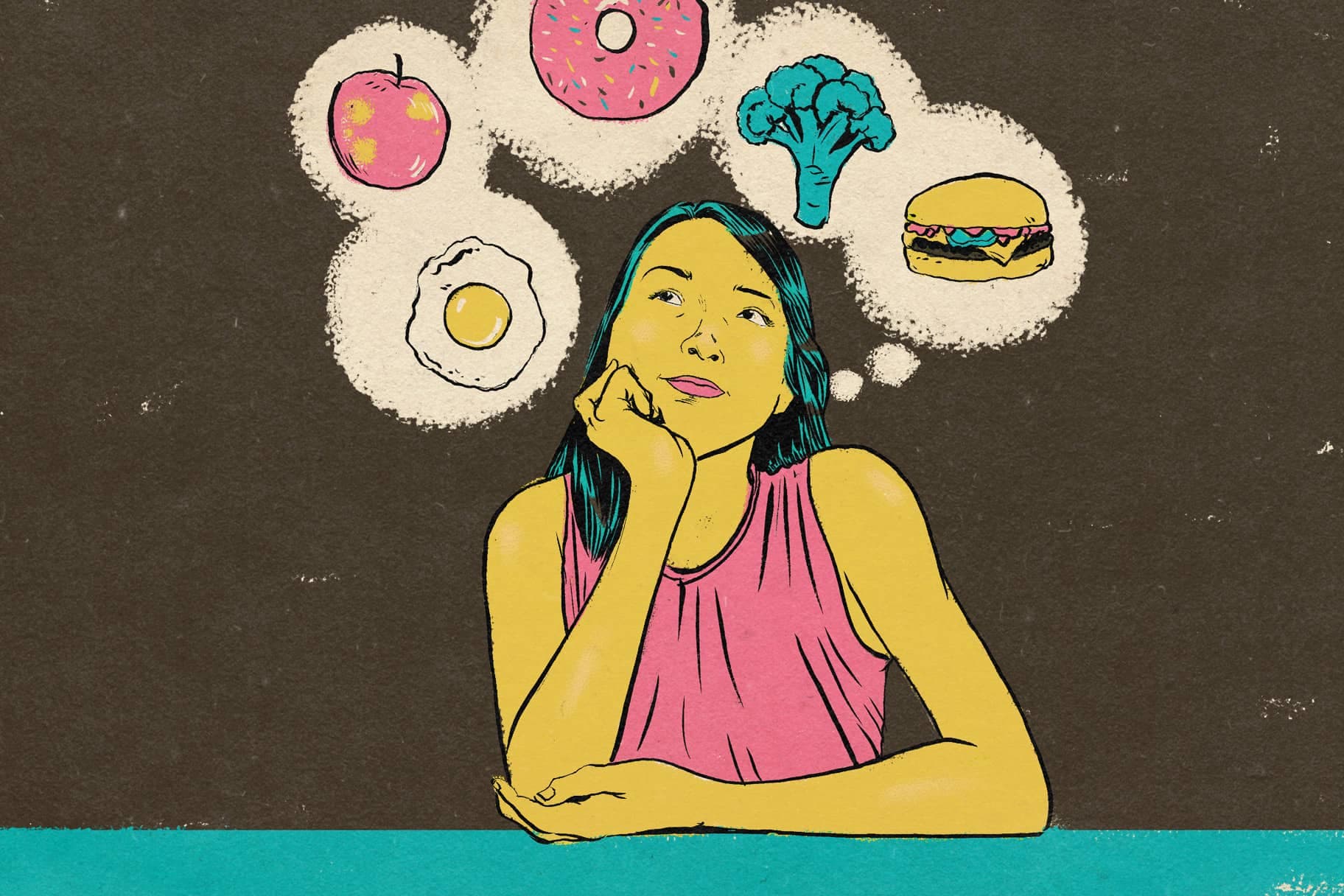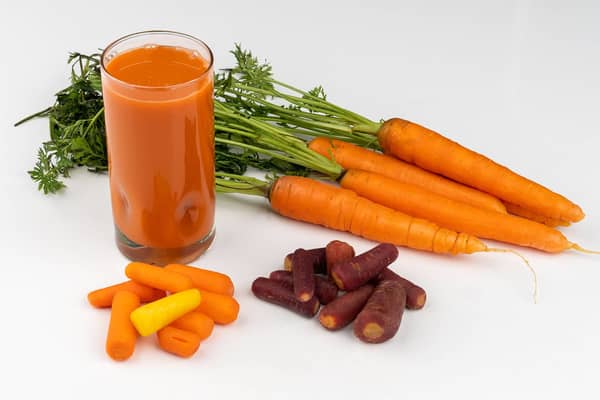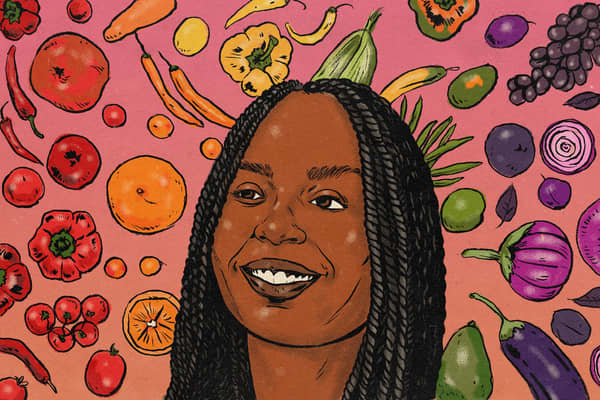What Is Intuitive Eating—And What Are Its Health Benefits?
Nutrition
Hyped-up trend or a fresh approach to healthy eating? Here's what dietitians say.

When it comes to deciding what and when to eat, the breadth of advice can seem overwhelming, particularly when those expert suggestions seem to conflict with one another. But there's one approach that eschews the outside guidance altogether: intuitive eating.
The concept was developed by two dietitians, Evelyn Tribole and Elyse Resch. Their book "Intuitive Eating", published in 1995, laid out 10 principles for the strategy. Intuitive eating, in summary, rejects diet culture and, in turn, encourages active listening to your body's cues of hunger and satiety. In doing so, the authors suggest intuitive eaters can cope with any emotions surrounding food and connotations of certain foods being labelled as "good" or "bad".
Also, when practising intuitive eating, you're usually encouraged to eat when hungry, rather than at scheduled or traditional times during the day.
"This is an evidence-based, mind-body health approach", said Laurie Allen, RDN, assistant professor in the department of nutrition at the University of North Carolina Greensboro. "The focus is on tuning out external messaging and learning how to listen and respond to our body's own signals".
Intuitive Eating Is an Individualised Approach

In contrast to a more rules-based strategy like intermittent fasting—"intuitive eating" is an umbrella term that's adaptable to individual goals and approaches, said Stephanie Hnatiuk, RD, who specialises in sports nutrition.
The intuitive eating approach is rooted in self-trust and developing confidence in eating with the intent of promoting health, she said. This connects intuitive eating to mental health. For example, a 2020 study that looked at adolescents and mental well-being found that those who ate intuitively as teens were less likely to experience depression and more likely to report greater psychological well-being as adults.
Another dietitian, Madison Friel, RD at Greater Baltimore Medical Center, said that intuitive eating may also be used to help identify foods and nutrients your body may need at the moment. For instance, if you're daydreaming about salmon, it's possible that you may be lacking key nutrients that fish provides, such as protein or omega-3 fatty acids.
"Intuitive eating relies on an intimate level of awareness between mind and body and aims to ignore structured or regulated eating patterns in favour of an instinctive, or intuitive, approach", Friel said.
How To Start Eating Intuitively

A helpful first step to giving intuitive eating a try is to adopt mindful eating strategies, Friel suggested. This refers to engaging the senses while eating in order to stay fully present. Mindful eating strategies include:
- Smelling food before tasting it
- Feeling the sensation of the food on the tongue
- Listening to the crunch from chewing
- Looking at each bite without distractions like TV or a smartphone
Ask yourself, what does the food smell like? What is the texture of the food in your mouth? Once you're able to regularly incorporate these mindful eating techniques, you can begin to expand by more closely evaluating your perception of various foods as you begin to honour your hunger without judgement.
If being fully present for every single bite isn't quite your groove, simply eating without any distraction can often be enough to prompt some level of intuitive eating awareness, McKenzie Flinchum, RD, said. She suggested that it's easier to eat slower this way, which allows you to recognise satiety signals sooner.
"Mindful eating also encourages putting everything else away and eating in a designated area so the focus can be placed on fully enjoying all aspects of the food", Friel said.
Another intuitive eating strategy is taking a moment when considering what to eat, no matter what the food might be, Flinchum said. Determining if it's a food you truly want, and not just an option because you feel stressed or bored, can help get you more in tune with what your body wants, in a way that will make you feel nourished.
For a more guided approach, it's helpful to consider working with a licensed registered dietitian or a certified intuitive eating counsellor, Hnatiuk said. Working with one of these experts may be particularly useful if restrictive eating has been an issue in the past. Adopting intuitive eating practices can be a key component of a larger strategy to recover from an eating disorder, and one that should be worked out with a licensed professional.
"I would strongly encourage anyone interested in learning more about intuitive eating to work with a professional who can help them navigate this transition", Hnatiuk said. "There are also a number of great books out there on the topic, but it's nice if you have someone in your corner who can provide support and answer the questions you'll have along the way".
How Can Intuitive Eating Benefit Your Health?

Because this approach pushes back hard against diet culture, it can often serve as an antidote to restrictive eating and pursuit of an ever-shrinking physical ideal, Allen said.
"Chronic dieting is often encouraged in order to lose weight, although evidence shows us that it is rarely sustainable in the long term and comes with a host of consequences, including preoccupation with food and poor self-esteem", she said.
In Allen's work with clients, she's found that the lack of emphasis on diet standards like calories, "bad" foods or exercise as a way to burn off poor eating decisions can all feel very refreshing, and even freeing, for those who have struggled with diets, Allen said.
"Intuitive eating is associated with higher self-esteem and greater body satisfaction and lower rates of emotional eating compared to those who don't practise this technique", she said.
"Recognising and honouring your hunger cues allows your body the nourishment it needs to provide you with energy and reduces the preoccupation and cravings that exist when we are restricting food intake", she said.
Potential Drawbacks of Intuitive Eating

As is the case with most alternative approaches to eating, intuitive eating may not be for everyone.
As simple as it sounds, learning to identify and differentiate between hunger cues and cravings, or emotionally motivated eating, can be very difficult, Friel said. Although intuitive eating does not categorise foods as "good" or "bad", and doesn't limit when or what to eat, it still requires conscious and intentional decisions around meals.
"If a degree of mindfulness does not already exist, intuitive eating can be mistaken as unregulated or uncontrolled eating", Friel said. "Intuitive eating can also be challenging due to its flexibility and lack of rules, especially for someone who typically thrives off structure and clearly defined guidelines".
For example, athletes who have specific nutrition needs based on the duration and frequency of their training usually need a much more structured and pre-planned approach.
That can make for a steep learning curve, Hnatiuk said, particularly for athletes who might be used to tracking macronutrient percentages, eating within a certain window of time before and after working out, and seeing some foods as problematic.
That said, simply building more awareness around how your body feels—and more specifically, what hunger feels like—can be a powerful way to tap into your mind-body connection. And, taking time to consider what foods truly nourish you may represent a meaningful and important mindset shift.
Words by Elizabeth Millard, ACE CPT, RYT





